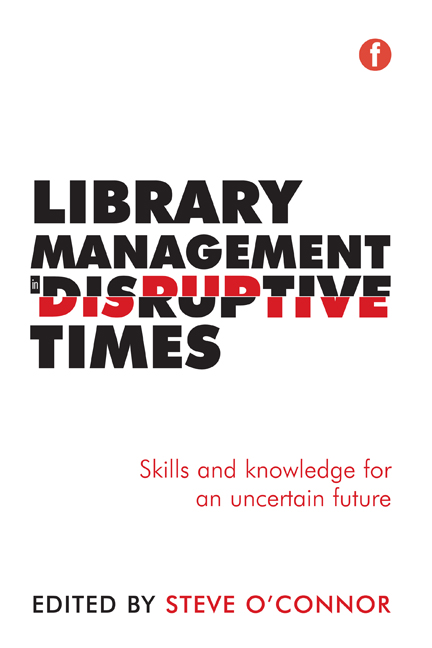Book contents
- Frontmatter
- Contents
- Contributors
- Introduction
- 1 Leading change: knowledge for success
- 2 Management fads and fashions and their impact on the LIS community
- 3 The Five Rules of Engagement for librarians: aux Ranganathan's laws of library science
- 4 Library management, disruption and consortia: an Australian example
- 5 No regrets; just lessons: economic crisis is changing our life and the management of libraries
- 6 Introducing agile principles and management to a library organization
- 7 The role of professional associations in changing times
- 8 And the walls came tumbling down ... The library profession confronts all-invasive new managerialism
- 9 What is behind the meaning of disruption? Or, thinking of management strategies from the outside
- Index
4 - Library management, disruption and consortia: an Australian example
Published online by Cambridge University Press: 08 June 2018
- Frontmatter
- Contents
- Contributors
- Introduction
- 1 Leading change: knowledge for success
- 2 Management fads and fashions and their impact on the LIS community
- 3 The Five Rules of Engagement for librarians: aux Ranganathan's laws of library science
- 4 Library management, disruption and consortia: an Australian example
- 5 No regrets; just lessons: economic crisis is changing our life and the management of libraries
- 6 Introducing agile principles and management to a library organization
- 7 The role of professional associations in changing times
- 8 And the walls came tumbling down ... The library profession confronts all-invasive new managerialism
- 9 What is behind the meaning of disruption? Or, thinking of management strategies from the outside
- Index
Summary
Introduction: the value of library consortia
Library consortia navigate a course between providing benefit to their member institutions through a range of collaborative activities and opportunities and, in return, requiring financial and in-kind commitments to sustain the consortium. Deriving benefit from library collaboration usually entails obligations from each participant, such as long-term commitment to programmes, active engagement of library leadership and staff in the management and co-ordination of activities, and both direct and indirect financial commitments to the consortium and the programmes it operates on members’ behalf.
The commitment implicit in any form of formal library collaboration can be twofold. On the one hand, members of a consortium have a commitment to the entity or organization set up to manage and co-ordinate a collaborative enterprise on their behalf, while on the other hand there is a commitment directly to the other participants in the collaborative activity. For example, a certain level of spending commitment may be required for a library to participate in a consortial acquisitions exercise, or a commitment to provide access to library collections may be a prerequisite of a collaborative resource-sharing or inter-lending programme. Such commitment may demand that a participating library undertake not just a share in the consortium's costs or management, but a degree of compromise and risk in committing and adhering to collaborative programmes and activities in the long term. Potentially, there is an inherent risk in collaboration, in so far as the object of the collaboration or the actions taken to achieve it may fail or may depart from the original aims. There is also a potential for compromise, in that an individual member may need to make concessions so as to accommodate the broader needs or interests of the group.
The value of collaborative library activity may also vary over time as the assumptions on which a joint enterprise is undertaken are undermined, for example, by systemic changes to the types of resources and services that the library offers and the way in which these are delivered, or by the opportunities that arise from technological or environmental changes and their potential to supersede the collaborative enterprise, or by the demands and imperatives set by parent institutions to demonstrate value and return on investment.
- Type
- Chapter
- Information
- Library Management in Disruptive TimesSkills and knowledge for an uncertain future, pp. 51 - 64Publisher: FacetPrint publication year: 2015



